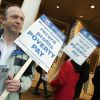-
 +26 +1
+26 +1How much is an hour worth? The war over the minimum wage
The long read: Some economists say it should be raised. Others say it’s already too high. But what if both sides are missing the point?
-
 +30 +1
+30 +1No CEO should earn 1,000 times more than a regular employee
For the first time ever, US corporations have begun reporting pay ratio data. And a movement is building to crack down on companies that don’t share the wealth
-
 +19 +1
+19 +1The Internet Is Enabling a New Kind of Poorly Paid Hell
For some Americans, sub-minimum-wage online tasks are the only work available.
-
 +24 +1
+24 +1Living in cars, working for Amazon: meet America's new nomads
Rising rents are leading Americans to live in cars and other vehicles
-
 +40 +1
+40 +1If You’ve Never Lived in Poverty, Don't Tell Poor People What They Should Do
Why being poor is expensive.
-
 +35 +1
+35 +1How To Fix Poverty: Why Not Just Give People Money?
Forget food aid, cows and job training. An unprecedented 12-year experiment in Kenya tests the power of cash.
-
 +19 +1
+19 +1Column: New study says the minimum wage hike in Seattle is bad for low-wage workers
Editor’s note: An economic working paper on the effects of a substantial minimum wage hike, such as the recent one in Seattle, commissioned by the city itself, is causing quite a stir in economic circles, both pro and con. The study finds that the minimum wage boost, now up to $13 an hour for large employers in Seattle, has cost jobs for the city’s lowest-wage workers. Though I’ve been warned against reading too much into an academic working paper that hasn’t even been peer reviewed yet...
-
 +14 +1
+14 +1Minneapolis City Council approves $15 minimum wage
The Minneapolis City Council approved a $15 minimum wage Friday, a move years in the making that will affect hundreds of businesses and thousands of workers across the city.
-
 +25 +1
+25 +1Seattle's $15 minimum wage may be hurting workers, report finds
As companies look for ways to cut costs, Seattle's $15 minimum wage law may be hurting hourly workers instead of helping them, according to a new report.
-
 -1 +1
-1 +1Ontario becomes 2nd province to go ahead with $15 an hour minimum wage
Ontario Premier Kathleen Wynne has announced a plan to increase the provincial minimum wage to $15 an hour by Jan. 1, 2019. The increase would be phased in over the next 18 months, rising to $14 an hour on Jan. 1, 2018, and then to $15 the following January. After that, it will rise annually with inflation.
-
 +30 +1
+30 +1Basic income isn’t just a nice idea. It's a birthright
Every student learns about Magna Carta, the ancient scroll that enshrined the rights of barons against the arbitrary authority of England’s monarchs. But most have never heard of its arguably more important twin, the Charter of the Forest, issued two years later in 1217. This short but powerful document guaranteed the rights of commoners to common lands, which they could use for farming, grazing, water and wood. It gave official recognition to a right that humans nearly everywhere had long just presupposed: that no one should be debarred from the resources necessary for livelihood.
-
 +29 +1
+29 +1Why Minimum Wage Hikes Work, in 3 Charts
The biggest argument against raising the minimum wage is that it’s going to end up cutting jobs. By having to pay each worker extra, the cost of producing goods or services will increase. So, the argument goes, employers will either pass that cost off to customers (by raising prices) or try to find savings elsewhere (by investing in equipment rather than workers, or reducing the hours their employees work). Either way, the total demand for labor will drop.
-
 +35 +1
+35 +1A day in the life of a care worker: 23 house calls in 12 hours for £64.80
It’s 6.30am and still dark, and Jean is setting out for her job as a home care worker. When she returns in 12 hours’ time she will have made 23 house calls to sick and elderly people, driven 20 miles between appointments and earned £64.80 before tax. Jean isn’t her real name. Along with fellow care workers in this northern town she is on a zero-hours contract and fears losing work if her employer is unhappy with her. She fears that speaking out about how she has to race between visits, cutting short her appointments in order to earn the “national living wage”, might result in an immediate loss of earnings.
-
 +27 +1
+27 +1We can’t go on pretending that poverty is solved by getting a job
Chris Johnes argues that getting a job is not necessarily a route out of poverty. Rising costs and falling real wages means that having a job won’t necessarily allow you to make ends meet. What’s worse, the auterity programme is hitting low-income households disproportionately hardest. We must, therefore, rethink the prevailing attitude towards taxes and social justice.
-
 +27 +1
+27 +1Hillbilly Elitism
The American hillbilly isn’t suffering from a deficient culture. He’s just poor. J.D. Vance’s Hillbilly Elegy: A Memoir of a Family and Culture in Crisis comes highly recommended: National Review executive editor Reihan Salam, Silicon Valley scion Peter Thiel, and “tiger mother” Amy Chua all wrote glowing jacket blurbs. Positive reviews have since appeared across the conservative press, in Salam’s National Review — where Vance regularly contributes — the American Conservative, and the Weekly Standard.
-
 +18 +1
+18 +1The Federal Poverty Line is Too Damn Low
The U.S. Census Bureau’s announcement today that the number of Americans living below the poverty line fell between 2014 and 2015 is good news. But before we get too excited, it is worth noting that the federal poverty line was a meager $12,000 for a single person living alone in 2015 (and only about $24,000 for a married couple living with two children).
-
 +17 +1
+17 +1The progressive case for replacing the welfare state with basic income
It appears some establishment voices have picked up on a way of opposing the idea of the monthly citizen dividend of about $1,000 per month, known as universal basic income (UBI), in a way that successfully leaves some progressively minded people afraid. The fear inspired is that those with the greatest need may be left worse off with UBI compared to the existing status quo of more than 100 government programs that currently comprise the U.S. safety net that UBI has the potential to entirely or mostly replace.
-
 +31 +1
+31 +1Reframing the Minimum-Wage Debate
Some prominent economists contend that a minimum wage high enough to provide a decent standard of living poses too high a risk of job loss. But this fear is purely speculative; we have no reliable evidence that a $15 wage floor, phased in over four to six years, would cause declining employment opportunities for low-wage workers. Indeed, the wage threshold at which substantial employment effects are likely to occur may be considerably higher.
-
 +16 +1
+16 +1So far, the Seattle minimum-wage increase is doing what it’s supposed to do
The Seattle minimum wage increase is working out fine so far, but that's not what you'd get from much of the reporting on it.
-
 +5 +1
+5 +1How the Fight for 15 Won
The political earth has shifted. Last week’s tectonic jolt began in California, where the legislature voted Thursday to raise the statewide minimum wage to $15, the highest in the nation. The ripple effects of California’s huge victory for progressive forces are already being felt around the country.
Submit a link
Start a discussion




















